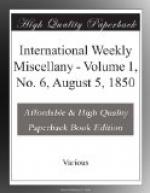* * * * *
FRASER’S MAGAZINE UPON THE POETS AND POETRY OF AMERICA.
The last number of Fraser’s Magazine has a long article upon THE POETS AND POETRY OF AMERICA, in which the subject is treated with more than the customary civility of English criticism upon this subject. We are half inclined, indeed, to believe the article was written “above Bleecker,” or by an inhabitant of that quarter now in London. Omitting the illustrative extracts, we copy the greater portion of the review, in which most of those who are admitted to be poets are characterized.
“When Halleck said of New York—
Our
fourteen wards
Contain some seven-and-thirty-bards,
he rather understated than exaggerated the fact. Mr. Griswold, besides the ninety regular poets in his collection, gives an appendix of about seventy fugitive pieces by as many authors; and bitter complaints have been made against him in various quarters for not including some seventy, or a hundred and seventy more, ‘who,’ it is said, and probably with truth, ’have as good a right to be there as many of those admitted.’ Still it is possible to pick out a few of general reputation, whom literati from all parts of the Union would agree in sustaining as specimens of distinguished American poets, though they would differ in assigning their relative position. Thus, if the Republic had to choose a laureate, Boston would probably deposit a nearly unanimous vote for Longfellow; the suffrages of New York might he divided between Bryant and Halleck; and the southern cities would doubtless give a large majority for Poe. But these gentlemen, and some three or four more, would be acknowledged by all as occupying the first rank. Perhaps, on the whole, the preponderance of native authority justifies us in heading the list with Bryant, who, at any rate, has the additional title of seniority in authorship, if not in actual years.
“William Cullen Bryant is, as we learn from Mr. Griswold, about fifty-five years old, and was born in Massachusetts, though his literary career is chiefly associated with New York, of which he is a resident. With a precocity extraordinary, even in a country where precocity is the rule instead of the exception, he began to write and publish at the age of thirteen, and has, therefore, been full forty years before the American public, and that not in the capacity of poet alone—having for more than half that period edited the Evening Post, one of the ablest and most respectable papers in the United States, and the oldest organ, we believe, of the Democratic party in New York. He has been called, and with justice, a poet of nature. The prairie solitude, the summer evening landscape, the night wind of autumn, the water-bird flitting homeward through the twilight—such are the favorite subjects of inspiration. Thanatopsis, one of his most admired pieces, was written at the age of eighteen, and exhibits a finish of style, no less than a maturity of thought, very remarkable for so youthful a production. Mr. Bryant’s poems have been for some years pretty well known on this side the water,—better known, at any rate, than any other transatlantic verses; on which account, being somewhat limited for space, we forbear to make any extracts from them.




